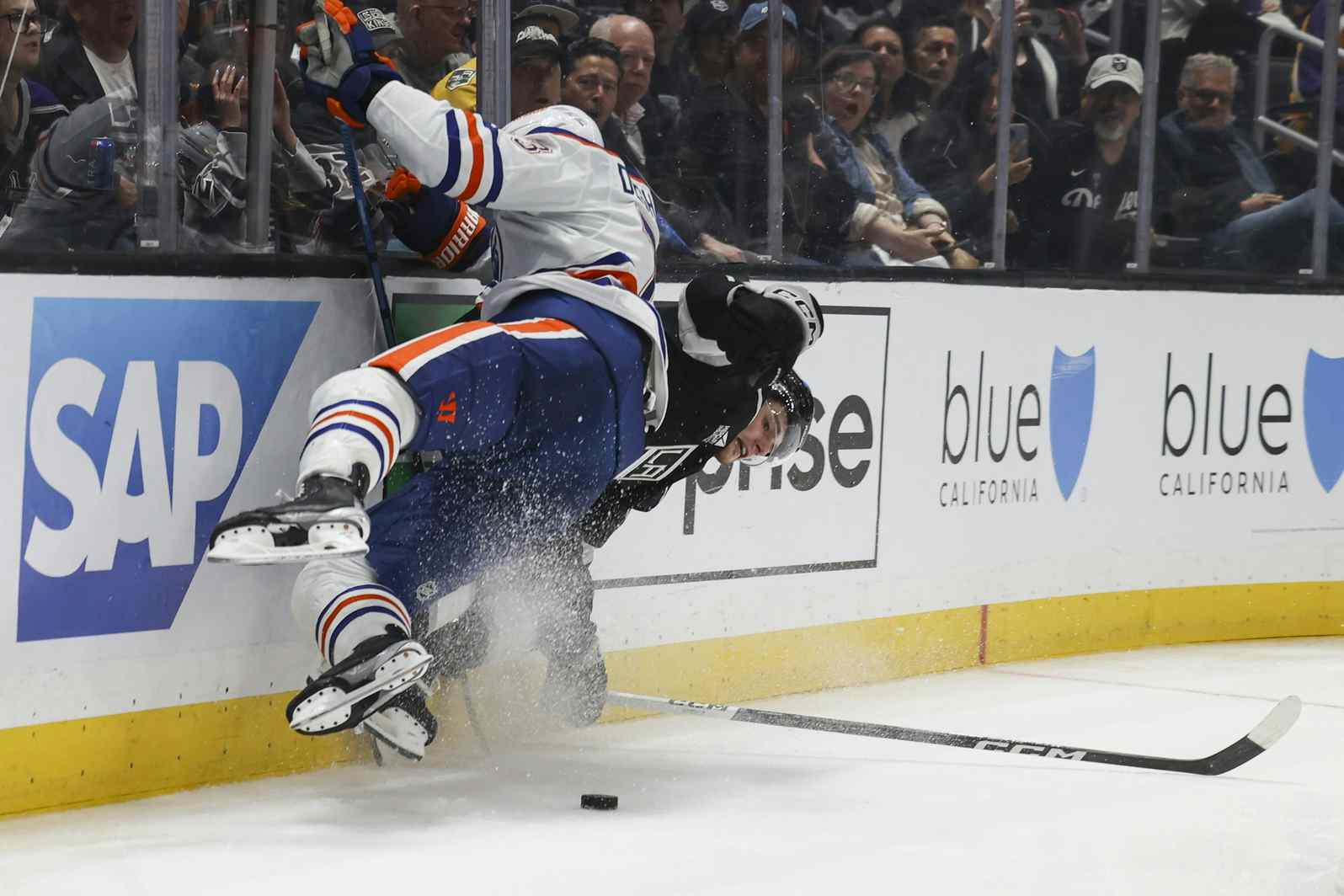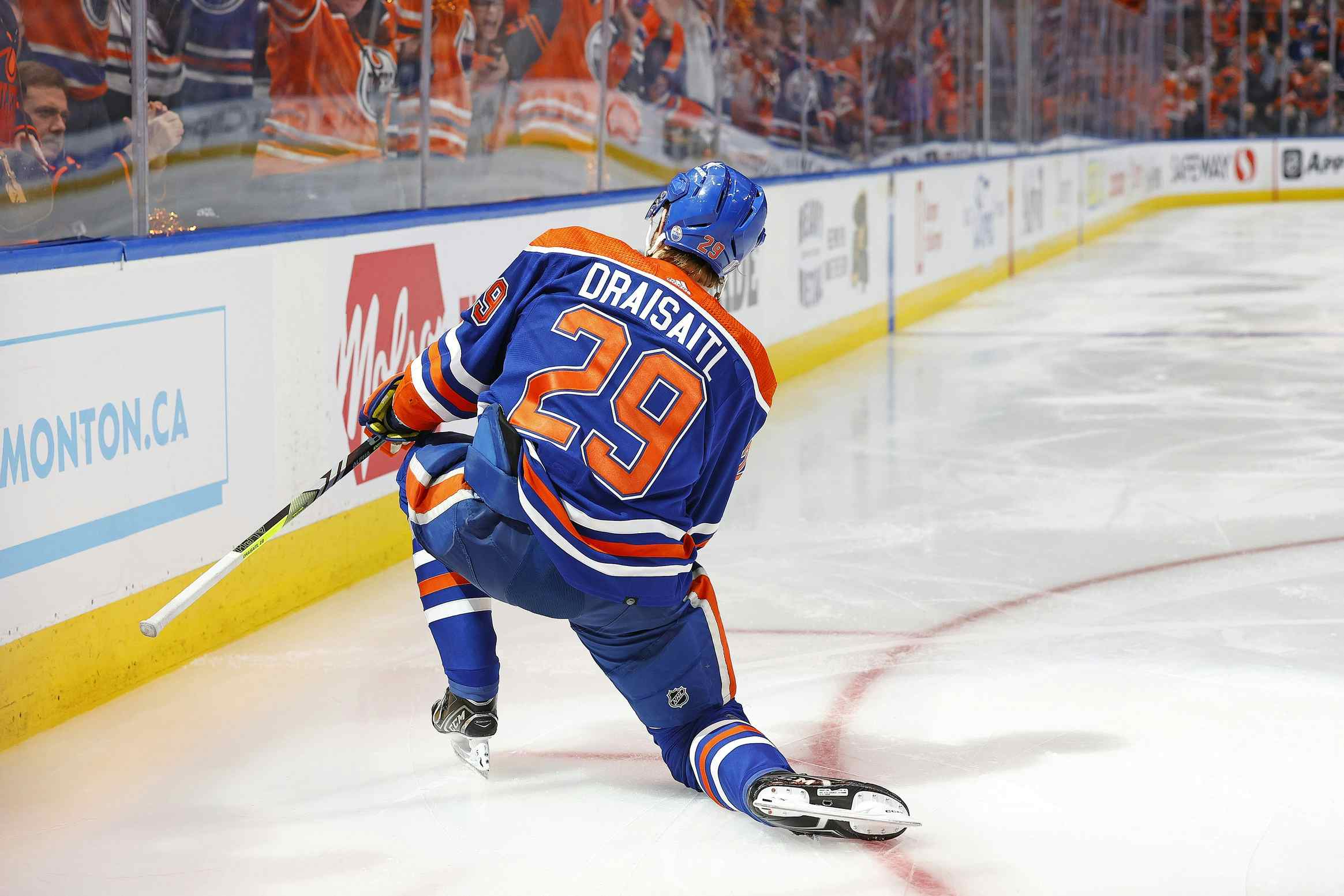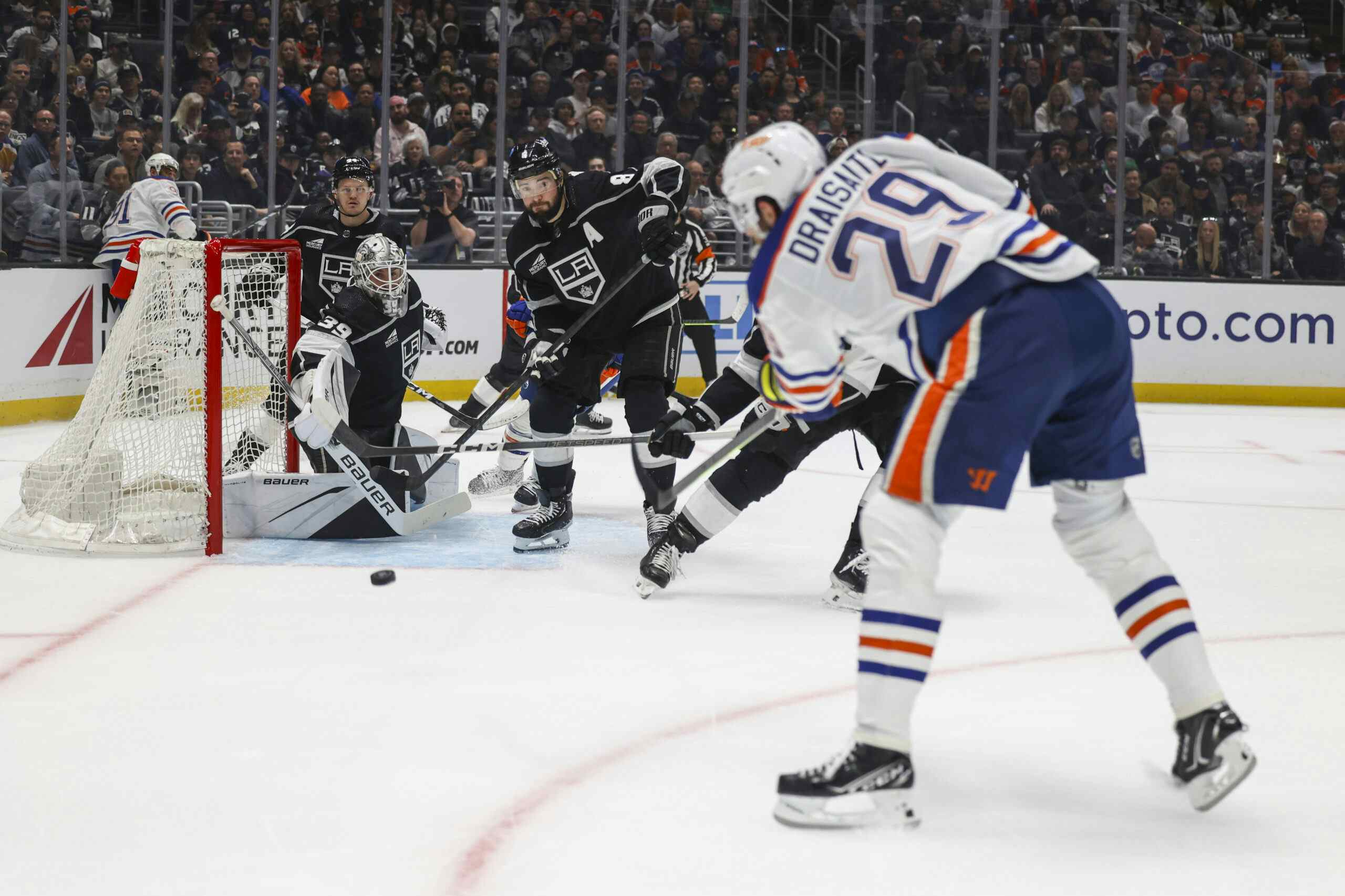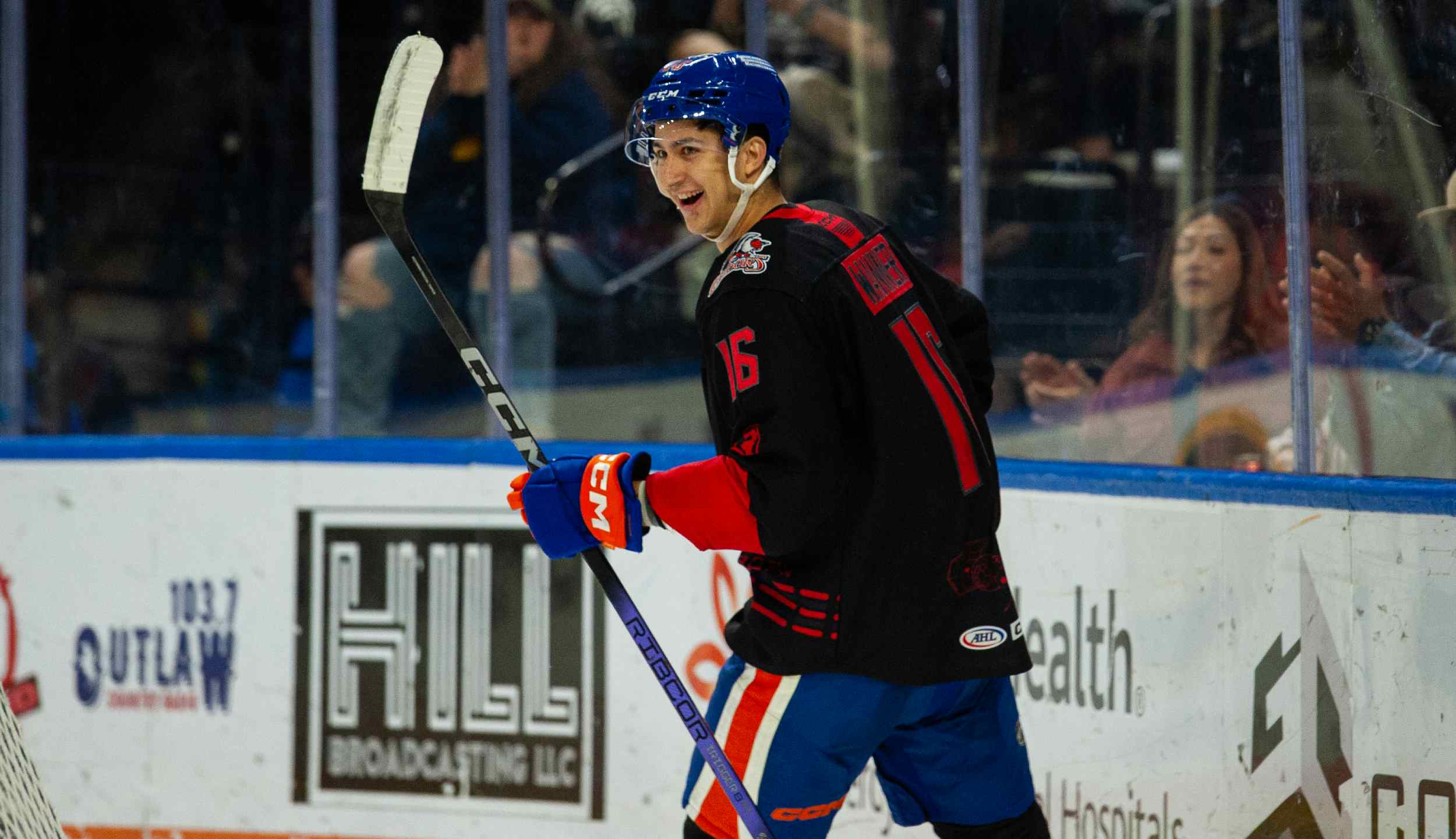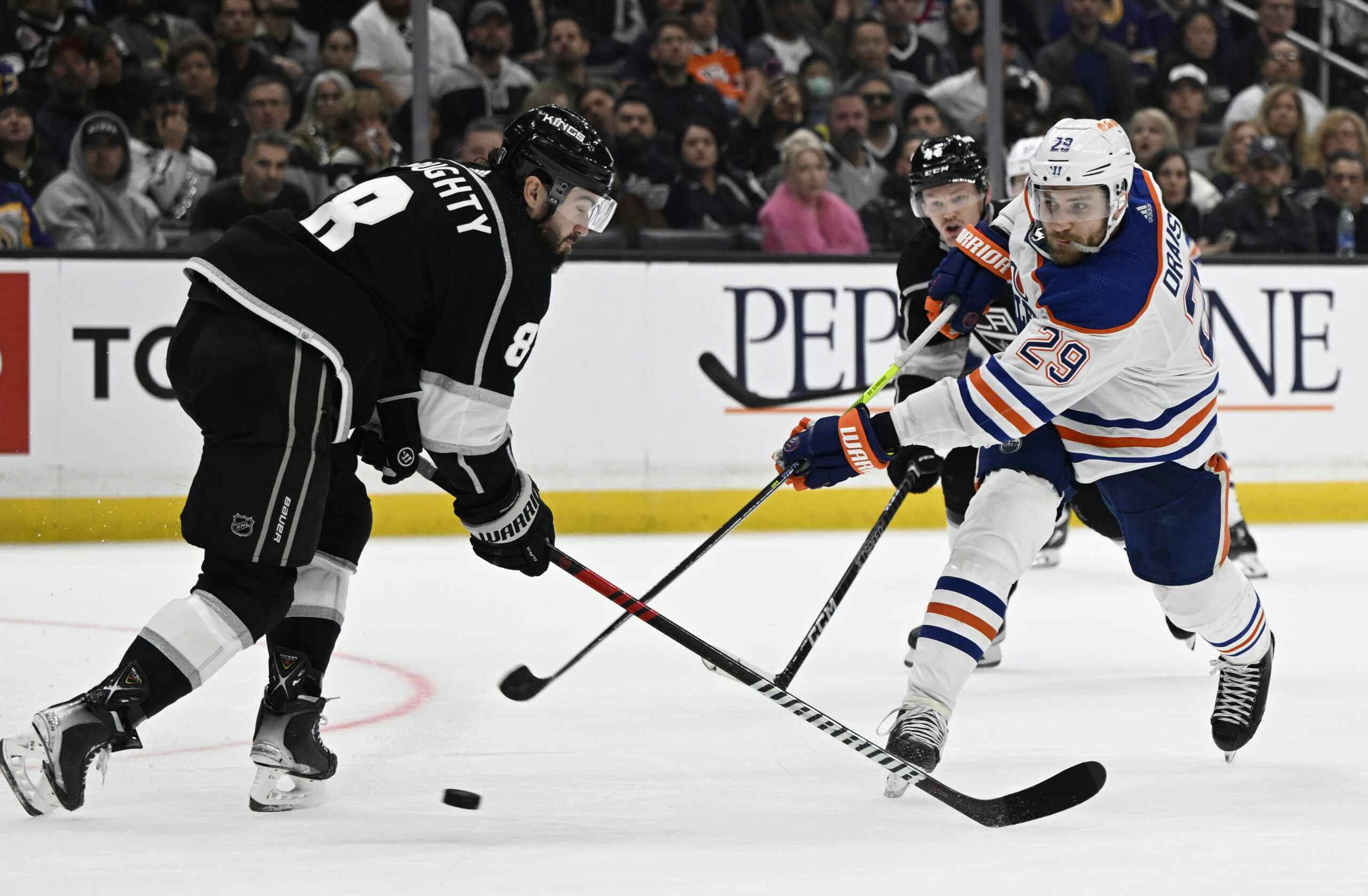JIM NILL: WE NEED A VETERAN CENTRE
By Jason Gregor
10 years ago
Jim Nill played 524 regulars season games in the NHL as a checking forward, but he’s made his mark in managment. He scouted for the Ottawa Senators for three years before the Red Wings hired in the summer of 1994. In the past 19 years he’s served as their head of amateur scouting, general manager of their AHL affiliate and assistant GM of the Red Wings.
He’s gained a lot of experience, and feels that Dallas is the perfect team for him to take over as GM.
I caught up with Nill on Tuesday and got his thoughts on hiring a coach, what type of team he wants to build in Dallas and how his experience with Detroit will help him as a rookie GM.
I caught up with Nill on Tuesday and got his thoughts on hiring a coach, what type of team he wants to build in Dallas and how his experience with Detroit will help him as a rookie GM.
Gregor: There were a lot of rumblings that you were close to signing Alain Vigneault, but he ended up choosing New York. What is your strategy now? When would you like to have a coach in place?
Nill: In the perfect world, I guess you’d like to have a coach in place by the draft. I’m going through the process and there are still a lot of guys to interview. If it happens before the draft, great, but it’s not a must. So we’re just going to continue on in the pace we’re going and wait for the right person to be there for us.
Gregor: Is it more important to have your coach in place for the start of free agency than it is the draft?
Nill: Yes. The draft, it’s more for the future. It’d be nice to have a coach there just to meet the players and get to know your staff and go through the meetings, but as you mentioned, probably more important for free agency. I’d like to have him in place for either of those dates, but I have to make sure I do the right thing too. It’s been actually a great process. It takes a lot longer than people realize. It’s just not a thing where you put down five names and in five days, bring in five people and you’re done with it. It’s a lot longer process than that and it just takes time to do the right thing.
Gregor: Are you looking for a coach with previous NHL head coaching experience?
Nill: That’s probably what I’d like to do, but I don’t want to be close minded also. There are some really good coaches out there that, I don’t want to say younger, but guys with a little bit less experience. If you look over the history, someone along the line of a Mike Babcock and these type of coaches, had to get an opportunity somewhere. There is a pretty good list of some real good coaches who are doing great jobs in the minors or elsewhere. I want to be open minded to that also. I’d like to have an experienced guy, we always like to have experienced guys, but like I say, you don’t want to be close minded and forget that there are some good coaches out there playing secondary roles right now.
Nill: That’s probably what I’d like to do, but I don’t want to be close minded also. There are some really good coaches out there that, I don’t want to say younger, but guys with a little bit less experience. If you look over the history, someone along the line of a Mike Babcock and these type of coaches, had to get an opportunity somewhere. There is a pretty good list of some real good coaches who are doing great jobs in the minors or elsewhere. I want to be open minded to that also. I’d like to have an experienced guy, we always like to have experienced guys, but like I say, you don’t want to be close minded and forget that there are some good coaches out there playing secondary roles right now.
*** Stars’ President Jim Lites, told the Star-Telegram an hour ago, "Unless something falls completely apart, we’re going to hire Lindy Ruff." Read more here.
DALLAS THE RIGHT FIT…

Gregor: You spent a lot of time in Detroit and you had a lot of success. I remember talking to you before and you said, ‘I’m loyal to that organization, to the Illitch family. They gave me an opportunity and I wasn’t ready to leave.” Why were you ready now? Why was the Dallas Stars position the right one for you?
Nill: It was kind of a combination of different factors. Dallas called me and they wanted to meet with me. I looked through their organization and there was a lot of different pieces of a foundation in place that really intrigued me. I met with ownership, Tom Gaglardi and his family, and they’re committed to winning. They’re very passionate about hockey, so that was very important.
Next thing was I went through the organization. They have some great people in place. Les Jackson, the Assistant General Manager, and he’s still in that role with me. Les and I go back a long time. He does a great job in all aspects of drafting and developing players, so I’m very comfortable with the front office staff. I looked from the players side and they’ve got some good young players; Jamie Benn, Brendan Dillon, Loui Eriksson, and Kari Lehtonen in net. There are some great pieces there in place.
Like any team, I know there are some older but everybody’s going to have that. So I’m excited about that. The slate is clean, there are no bad contracts. There’s lots of room to make decisions if you have to. You’re not handcuffed by some big contracts. Then I was impressed with their minor league operation. Their minor team is in Austin, it’s three hours down the road from Dallas. If you need to get a player up, it’s a car ride up.
They’ve got some real good young players coming up. They’ve got Oleksiak, Connauton, and Morrow on the back end. They’ve got Reilly Smith, who was a Hobey Baker finalist a year ago from college hockey. They’ve got Brett Richie coming up. So there are some real good pieces to the puzzle there. I remember when I was with Detroit; we went to Dallas, played against them in the Western Conference Finals. It was a great environment, they’ve got passionate fans here, and like anywhere else, if you start winning I know they’re going to come back. It was a combination of all those. You get a gut feeling; it’s just the time to do it.
Gregor: You come from an organization in Detroit that had the luxury or the patience of always keeping guys in the minors, always letting them develop, and often not bringing them over from Europe until they’re twenty-two or twenty-three. Do you expect to have that same mentality with your Dallas Stars organization, and let guys like Oleksiak have an extra year or half a season down in the minors?
Nill: Yes. When I first talked to our staff, the amateur and pro, I emphasized that was the key. For us to have success, I know that’s what we have to do. The one word that is lost in this business is patience. It’s not easy because there is pressure to win all the time. You have to have patience; you need to build up your depth. That’s going to be our motto moving forward, is that we have to have patience and let these guys develop at their own pace. It’s just very important.
Gregor: Is it fair to say you don’t plan on making any compliance buyouts?
Nill: That’s correct. We have no contracts hanging over our head. We’ve got all young kids and the older guys are players that we like. I just made a trade to pick up Sergei Gonchar’s rights and got him signed. We need to add that veteran presence. That’s something we want to add to the roster. We have Ray Whitney, who had a great season last year. The veterans that are in place, we like and we actually need to add to those types of character players to our roster right now.
Gregor: Have the phone lines started to heat up? There are a lot of teams that are in a cap crunch who have to get a rid of a bigger contract, and in some cases that guy is still a good player. Is that something that interests you?
Nill: We’re very open to that. I talked about having a clean slate. We do have a clean slate here. We have lots of cap space. So we’re very open to that and we’ve had a lot of conversations with teams. Everybody knows who those teams are; we’ve been in contact with them. If it’s the right player, for the right price, and the right situation then we’d definitely look at that.
MORE ADDITIONS?

Gregor: You mentioned veterans. You add Sergei Gonchar on the back end. Do you need another veteran defenceman, or do you need more veteran forwards?
Nill: Our blueline is okay now. Adding Sergei really helped. He gives us a power play presence now, to go along with Goligoski. That gives us two good guys for our power plays. I’d like to change the make up of our defence a little bit, add a bit of size and grit to it. Who wouldn’t? I know every team is trying to do that. The one area that we need to improve on is going to be at centre ice. We are short at centre ice. I know you’re not just going to grab a first line centre man out of nowhere, I know that. We just need to fill in that hole for a couple years until our good young players coming up develop. For now, we just need to fill it in with some real good, solid veterans down the middle to compliment our team.
Gregor: Do you see your team as one that, with an addition of one or two solid veterans, could compete right away for the playoffs? Or are you looking at building a team that becomes a staple in the playoffs?
Nill: Well that’s the key, what you just mentioned being a team that’s consistently in the playoffs. That’s where you have to build up your depth; you have to let the kids develop at their own pace. We think with a couple of additions here are there, we are very close to being a team making the playoffs. That’s what our game plan is, to get in the playoffs. Over the last three years, Dallas has been one of the teams over the last two, three weeks of the season has been a team right on the bubble of that sixth, seventh, eighth, ninth, tenth spot. It’s been two or three wins away from the playoffs. We just need to add the right pieces to the puzzle so that we’re one of those teams always in that five, six, seven, eight team hole.
When I talked to the players, the organization, I said we need to get out of the mud. We kind of get ourselves a little bit in the mud, end of the year you’re really scrambling to get into that eighth seed. We just need to get ourselves out of the mud and back into the swimming pool.
Gregor: In Detroit, you were a very successful organization. Ken Holland liked to deviate and allow guys to do things; there wasn’t just one guy who made all of the decisions. But ultimately when you’re the GM, you make the ultimate decision. You will be that guy now. How is it different? How do you know what’s the right move, when you become the final decision maker? Is that something you’ve prepared yourself for, or can you even prepare for it when you’re the Assistant GM?
Nill: I look back over my career, I had opportunities to go to other teams. When I look back over those situations, there were a lot of times I wouldn’t have been ready. I’ve learned from those situations. I now think it is the right time. It’s been almost twenty years of being in Detroit. I’ve lived and breathed different situations that took place. Ten years ago, would I have been ready? Probably not. I would have been learning on the job too much. I’m pretty comfortable now.
I’ve seen a lot of things happen, I’ve learned from some great hockey minds. You’re talking Jim Devellano, you’re talking Scotty Bowman, Ken Holland. I’ve learned from some of the best in the business. So like I said, I’m ready for it now. I’m confident about that. I think the other important thing is you need to have a strong support staff. I know we’ve put that in place with our team in Dallas. I’m looking forward to the opportunity.
Gregor: Can you go a little bit more in depth on what you think you would have needed to learn on the job ten years ago, where now you know it and it’s not something you’re concerned with?
Nill: There are situations that arise and I guess it’s just being in the moment. I get back to maybe having patience at the right time. When you come to make that decision, you need to be able to pull all your resources together of situations you’ve seen over the years. Like I said, ten years ago I hadn’t built up my resume enough. I hadn’t seen enough of those situations where you analyze and say, “well I remember this situation, this worked this didn’t.” The more information you can grab to make it come together, will help you so you make a final decision.
That comes from just years of experience. You see it in the draft all the time. A lot of our business is projection, how a player is going to fit into a situation. The more examples you can grab from prior experiences to say, “okay, I think this players is going to fit into this situation,” the better off you are. If you haven’t lived that, or you haven’t had that experience, it’s hard to do.
WINNING CULTURE…

Gregor: Building a winning atmosphere. How do you feel the general manager can pass that down throughout the organization?
Nill: Well that’s where I’ve got to do a good job at managing. When you’re a manager, it’s about bringing people together to succeed in the right positions. That’s where I have to do a good job of hiring the right people and letting them do their job. When I was the head scout, it was easy to say, “I’m making this call. I’m going to make this decision on this player.” That was my job; it’s all I had to do.
When you’re the GM, you have to hire the right scout, the right head scout to make the right decision. Hire the right coach who is going to make the right decision on the ice. You need to hire the correct training staff, who are looking after the players. You need to manage all those different positions in the organization. If you do that, hire good people, manage them, let them grow and do their best, I think you’re going to be successful.
That was a big part of Detroit’s winning. If you looked at all the people over the years that have been in Detroit’s organization have gone on to other teams: Paul MacLean the coach of the year, Todd McLellan in San Jose, Steve Yzerman in Tampa Bay, and it goes on and on. It’s about hiring the right people and managing them. If you do a good job at that, they’re going to make you look awfully good.
Gregor: Going back to hiring your head coach. Are you looking for an offensive guy, or a defensive first type coach? What type of requirements do you need in your new head coach?
Nill:It’s been a great process, interviewing these coaches. I’ve been very impressed. It’s amazing the number of great coaches that are out there. I can’t say there is one coach that I’ve interviewed, that’s not a good coach. A lot of it is the situation they’re put in. A lot of it is the support staff you’re going to give them. Is the GM going to be there for him and support him every day?
To say, do you want an offensive guy, a defensive guy, I think they’ve all got those traits. You have to play good defensive hockey to win in this league. We all know that. It doesn’t matter what sport you’re in. You have to play good defence to be a winner. They’ve all got those skills. It’s just finding the right mix for the players that we have in place right now.
We’ve been out of the playoffs for five years. I’ve talked about it; we need to change a bit of the lifestyle in the dressing room. I need a guy that’s going to come in there, he’s going to crack the whip but he’s also going to be respected by the players and do a good job of developing the young kids. I’m pretty confident I’m going to find the right person to do that.
WRAP UP
I really was intrigued by Nill admitting he needed more experience before becoming a GM. I doubt he gets caught off guard very often in his new role. That doesn’t mean he won’t make mistakes, but I don’t see him making any James Neal for Alex Goligoski trades.
Nill is looking for a veteran centre to fill a void for a few years and admits they aren’t afraid to add salary. Would he take Shawn Horcoff? He might, but he’d need to shed some salary. I’ve heard rumblings the Stars might move Trevor Daley. If the Oilers ate $1 million of Horcoff’s cap hit the next two years, is that trade possible? Nill likes veterans and Horcoff spent a lot of time around Detroit players the past few summers, so there is a connection. Maybe this specific deal doesn’t happen, but Horcoff is the type of veteran centre the Stars are looking for.
RECENTLY BY JASON GREGOR
Recent articles from Jason Gregor

